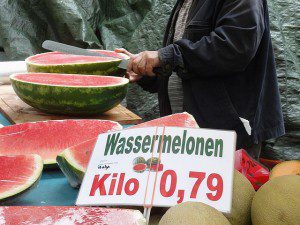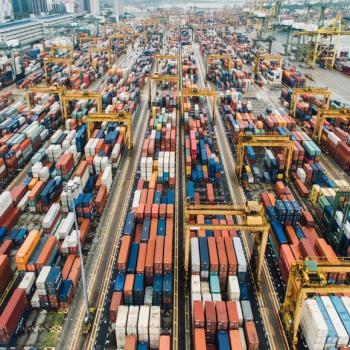 This I think is one of my fundamental disagreements with the “Acton philosophy.” One of the other attendees at Flanders’ lecture made the point well by saying, “here at Acton we are concerned with ‘right action,’ and distributism seems to violate that.” In other words, for Acton the free market is the only possible right way to structure an economy. Allegedly it will produce the good results desired by other systems without their inconveniences. But in the end, as in this question of the concentration of wealth, if it doesn’t produce the results, then the method and not the results takes precedence.
This I think is one of my fundamental disagreements with the “Acton philosophy.” One of the other attendees at Flanders’ lecture made the point well by saying, “here at Acton we are concerned with ‘right action,’ and distributism seems to violate that.” In other words, for Acton the free market is the only possible right way to structure an economy. Allegedly it will produce the good results desired by other systems without their inconveniences. But in the end, as in this question of the concentration of wealth, if it doesn’t produce the results, then the method and not the results takes precedence.
I understand, of course, that the argument holds that since wealth is continually increasing, the concentration of wealth harms no one. That is to say, Acton free-marketers don’t think that this particular consequence is something we should worry about. But from a distributist perspective, the concentration of ownership in relatively few hands leads to the dependence of everyone else on those few, and this is indeed a consequence that ought to worry everyone.
Bergsma argued that Egypt is an example of a “command economy.” But from a distributist perspective, the parallel would hold with any structure in which a few people hold most of the power and own most of the wealth. Whether they are government bureaucrats or CEOs is relatively unimportant in terms of its effect on the rest of us. Indeed, distributists turn around the accusation of dependence on state intervention. While Acton speakers consistently denounce “crony capitalism” and call for “separation of economy and state,” this pure free market seems in practice to be just as elusive as the pure communism of Marxist ideologues.
In practice, wealthy corporations seek government patronage, and governments seek the support of those with wealth and power and influence. Just as no society exists without a religious framework, so no economy exists without a social and political framework. The concentration of property in few hands inevitably leads to the involvement of the state on behalf of those with the power to influence politicians, with disastrous effects for the rest of us.
So if Flanders’ initial suggestion is right that the free market can get us where, from a distributist perspective, we need to go, then so much the better. Long live subsidiarity! But if, as Flanders later admitted, an unregulated economy naturally tends toward the concentration of wealth, then the “free economy” will turn out not to be conducive to human freedom after all.
Or, in the words of Richard Thompson,
“Pharaoh he sits in his tower of steel
The dogs of money all at his heel
Magicians cry, Oh Truth! Oh Real!
We’re all working for the Pharaoh. . . .
Call it England, call it Spain
Egypt rules with the whip and chain
Moses free my people again!
We’re all working for the Pharaoh.”
 Edwin Woodruff Tait is a freelance writer, farmer, and consulting editor for Christian History magazine. He blogs at Ithilien and tweets as @Amandil3. (Extra points if you get the Tolkien reference.)
Edwin Woodruff Tait is a freelance writer, farmer, and consulting editor for Christian History magazine. He blogs at Ithilien and tweets as @Amandil3. (Extra points if you get the Tolkien reference.)












